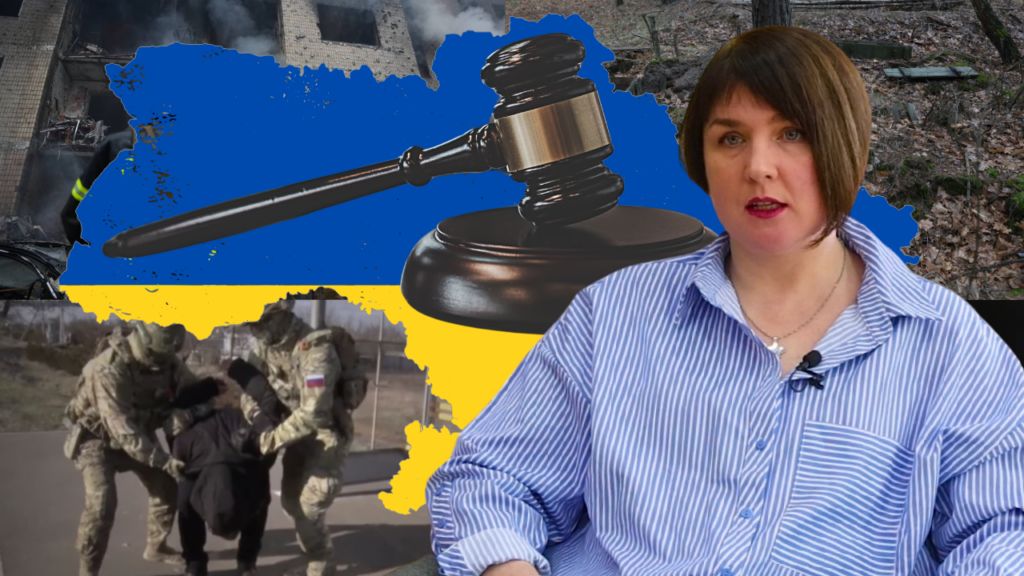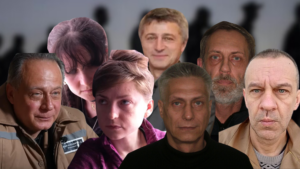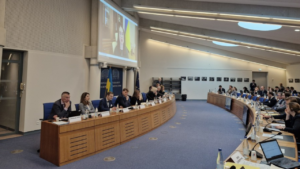One Conviction for Every Thousand Russian War Crimes: Ukrainian Justice Fails to Keep Up with Reality

In the three years since Russia launched its full-scale invasion of Ukraine, Ukrainian law enforcement has documented over 150,000 war crimes. These crimes occurred wherever the Russian military has set foot. The staggering scale suggests Russia’s coordinated intent and policy aimed at the destruction of Ukraine as a nation. Yet the national justice system paints a different picture. Ukrainian courts have not been able to reflect the true scope of Russia’s crimes against the Ukrainian people. Anna Rassamakhina, MIHR’s expert in international humanitarian law, explains what needs to be done to straighten things out.
A Dead End in Investigations
As of early March, Ukrainian courts have handed down just 111 convictions in war crimes cases. This number – despite frequent affirmations of the resilience of Ukraine’s justice system – pales in comparison to the staggering total of more than 150,000 registered war crimes.
A vast number of investigators are involved in the process, and cases are being heard in courts across the country. Yet the overall effectiveness remains low. One of the primary reasons is the gaps in the Criminal and Criminal Procedure Codes, which are not equipped to support the comprehensive investigation and prosecution of crimes on this scale.
The thing is that Ukrainian courts address only isolated cases in which individual suspects have been identified, while the broader, systemic nature of the Russian military’s criminal conduct remains largely unexamined by the judiciary. One hundred and eleven convictions represent fewer crimes than were committed in a single district of Kyiv region during just one month of Russian occupation in 2022. Even if we see several hundred more convictions in the future, their total would still be nowhere near commensurate with the true scale of atrocities. What’s more concerning is that in the convictions available, judges focus solely on the malicious intent of individual Russian soldiers, without recognizing or addressing the aggressive state policy of the Russian Federation itself.
To us, it is clear that investigations into Russian war crimes have reached an impasse. Each instance of torture, arbitrary detention, killing, looting, and other abuses is being treated as a standalone case. But this approach is fundamentally flawed. In legal terms, these are not isolated crimes. They constitute the components of a much larger crime against humanity – a large-scale and systematic attack by Russia that aligns with its state policy.
Retroactive Power
One of the core principles of criminal law is nullum crimen sine lege – no punishment without law. In other words, for an individual to be held criminally liable, their actions must be defined as a crime under applicable law.
Until October 24, 2024, the Ukrainian Criminal Code did not contain an article addressing crimes against humanity. As a result, violations that clearly bore the hallmarks of both war crimes and crimes against humanity were prosecuted solely under Article 438 – violations of the laws and customs of war. Now, with the relevant amendments in place, there are no legal obstacles to investigating and prosecuting crimes against humanity.
However, a legal challenge remains: under criminal law, a person can only be held liable for a crime if that crime was defined in legislation at the time it was committed. This is one of the fundamental principles of criminal justice. It means that the law cannot be applied retroactively. The only exception is when a new law decriminalizes an act or reduces the severity of criminal liability. As a result, Ukrainian courts can only prosecute crimes against humanity that were committed on or after October 24, 2024.
The problem is that Russia and its allies have been committing these crimes in Ukraine since February 2014. Crimes against humanity are inherently complex. They consist of numerous acts, involve multiple perpetrators, and unfold over a period of time. Take, for example, the mass detentions, torture, killings, and deportation of civilians: these have been ongoing since February 2022. Some people detained in the Kyiv region three years ago are still being held in Russian prisons, with no indication of when they will be released. Investigating crimes against these people based only on what happened to them after October 24, 2024 would be both unjust and inadequate. The same applies to filtration measures in occupied territories, the persecution of civilians, etc.
Not a single crime against humanity committed by Russian forces in Ukraine began in October 2024.
A Shared Responsibility
At present, there is a growing sense that investigating crimes against humanity at the national level in Ukraine may not be feasible. However, because these are among the most serious crimes under international law, holding perpetrators accountable is a shared responsibility of all humankind.
The principle of “no punishment without law” is enshrined in Article 7 of the European Convention on Human Rights, which forms part of Ukraine’s national legal framework. According to this article, no one shall be held guilty of any criminal offence on account of any act or omission which did not constitute a criminal offence under national or international law at the time when it was committed. However, the article also provides an important clarification:
“This article shall not prejudice the trial and punishment of any person for any act or omission which, at the time when it was committed, was criminal according to the general principles of law recognised by civilised nations.”
This part of Article 7 is key to understanding whether individuals can be held accountable for crimes against humanity committed in Ukraine prior to October 24, 2024. The essence of this provision is that an act recognized as a crime under the general principles of law remains a crime regardless of whether it was codified in national legislation at the time it was committed.
A number of judgments by the European Court of Human Rights have clarified the scope and interpretation of Article 7. One notable example is the case of Drelingas v. Lithuania. Drelingas, a former officer of the Soviet security services, was involved in the arrest of the leaders of the Lithuanian partisan movement in 1956. In 2015, a Lithuanian court convicted him for this as an act of genocide.
Drelingas appealed his conviction to the European Court of Human Rights, arguing that the Lithuanian law did not contain the concept of “genocide” in 1956. However, the ECHR found that the actions of the Lithuanian court did not violate Article 7 of the Convention, as genocide was already criminalized under international law at that time. Therefore, his conviction was lawful.
Although this ruling specifically concerns genocide, the same legal reasoning applies to crimes against humanity committed during the Russian-Ukrainian war. The definition of “crime against humanity” appears in the Charter of the Nuremberg Tribunal, the Convention on the Non-Applicability of Statutory Limitations to War Crimes and Crimes Against Humanity ratified by Ukraine in 2008, and multiple resolutions of the United Nations General Assembly.
The Convention on the Non-Applicability of Statutory Limitations to War Crimes and Crimes Against Humanity demonstrates that Ukraine recognized crimes against humanity as international crimes as early as 2008. By ratifying this convention, Ukraine effectively incorporated this norm into its national legal system.
Moreover, even before Russia’s full-scale invasion, Ukraine had twice accepted the jurisdiction of the International Criminal Court over crimes against humanity committed on its territory.
What Needs to Be Done?
In light of these legal arguments, MIHR recommends amending Ukraine’s Criminal Code to include a provision on the retroactive application of the article on crimes against humanity. This could take the form of a safeguard, stating that liability for crimes against humanity arises regardless of when they were committed. Since the Criminal Code is based on the Constitution of Ukraine and universally recognized principles and norms of international law, such an amendment can be implemented in accordance with Article 7 of the European Convention on Human Rights.
Lithuania has already taken this path. Article 3 of the Criminal Code of the Republic of Lithuania stipulates that the law does not have a retroactive effect. However, there are specific exceptions, namely, accountability must still apply for crimes such as genocide, treatment of persons prohibited under international law, the killing of persons protected under international humanitarian law, deportation, torture, unlawful appropriation of property belonging to persons protected under international humanitarian law, forcing civilians or prisoners of war to work for the enemy’s armed forces, destruction of protected objects, looting of national assets, acts of aggression, prohibited attacks, the use of banned means of warfare, and failure of commanders to fulfill their obligations.
If such or similar amendments are made to Ukraine’s Criminal Code, investigators would be able to reclassify registered war crimes as crimes against humanity. This would allow Ukraine to investigate Russian atrocities for what they truly are: a deliberate, state-sanctioned policy orchestrated at the highest levels of government. Under this framework, the identity of perpetrators in isolated incidents would no longer carry the same central weight as it does in the investigation of war crimes.
Although holding perpetrators accountable for crimes against humanity – regardless of when they were committed – is fully consistent with the principles of international law, Ukraine’s Constitution includes a provision prohibiting the retroactive application of criminal law. This means that before the Criminal Code can be amended accordingly, the Constitution itself would need to be changed, which is impossible under martial law. Nevertheless, such amendments are critically important. They may be the only viable path toward uncovering and documenting the full scale of Russia’s crimes in Ukraine, and toward ensuring justice for victims.








